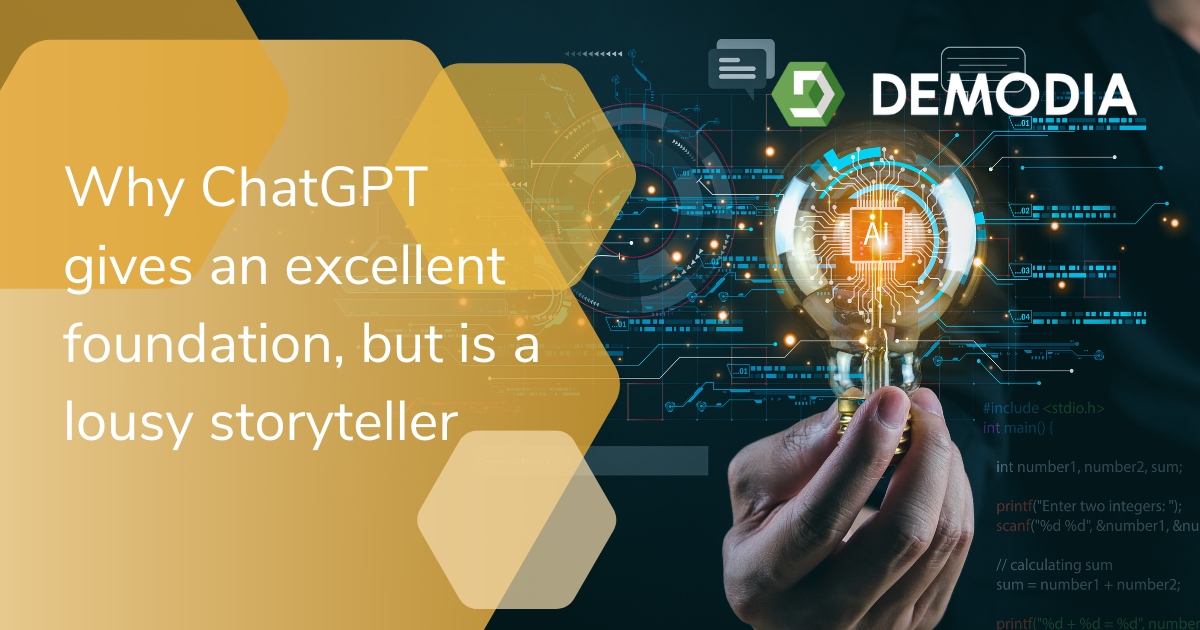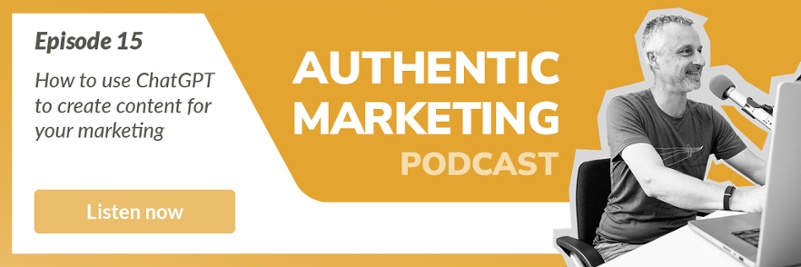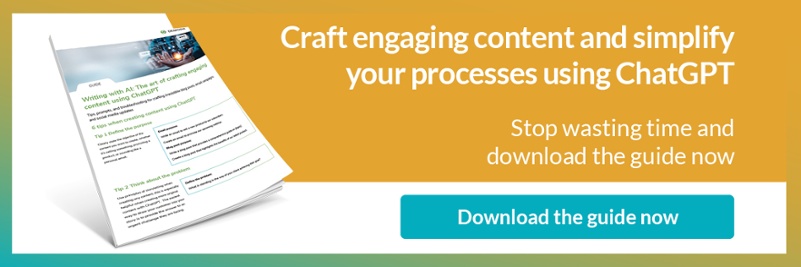The advantages and limitations of ChatGPT for content creation

My new colleague makes me nervous. He can write. Straightforward, precise and almost error-free. Sometimes he can't cope with complicated topics, but otherwise? A real asset. Versatile, accomplished and, above all, incredibly fast. Sure, we're talking about ChatGPT, the programme that created hype because it promised to do any writing job from Instagram caption to whitepaper in seconds and to perfection. Offers to use artificial intelligence (AI) for content creation pop up in my email inbox and social media feeds like dandelions on the roadsides. And behind that, of course, is the anxious question: is there even a need for humans to write anymore?
What can AI do for content? Where are the limits and how should AI be used?
The advantages are obvious:
A lot of content in a little time: AI can help create content “en masse” and do it all with consistent language, structure and tone. The Associated Press (AP) news agency uses AI technology to create over 3000 automated news articles each quarter, allowing AP to report on current events faster than its competitors.
Better readability: In the past, articles in newspaper newsrooms were edited by experienced staff who made them more readable and understandable. Today, AI tools do this job. They can analyse content and make suggestions so that articles are more legible and easier to read.
No more grammar mistakes: Especially in English, AI-supported tools like Grammarly, ProWritingAid and Hemingway can check grammar and thus improve texts. German alternatives are getting better and better, but don't yet reach the quality of their English counterparts.
Getting personal with AI: AI can analyse user data and develop content tailored to specific audiences. The New York Times newspaper has implemented an AI chatbot called "The New York Times Discovery" on its website. The chatbot analyses readers' comments and interests and recommends articles according to their taste.
The first thing that anyone who deals with programmes like ChatGPT learns is that the application is only as good as the instruction with which it is given to work. ChatGPT, therefore, rises and falls based on its prompt, the command used to create the text. Prompting will certainly soon be part of the skills of content creators like research or image editing. Effective prompting is helped by an old journalist's rule:
- Who?
- What?
- How?
When I prompt, I explain to ChatGPT exactly who I am, i.e. what role ChatGPT should take. For example, "Act like a creative content writer."
Then the what: "Create me a 500-word blog post that starts with an example and ends with a summary."
Lastly, I define the how, i.e. the tone in which ChatGPT should write the text:
"Use meaningful words and an informal tone to encourage readers to read the blog post and book an appointment at the end."
I add special words or information that ChatGPT should use in inverted commas.
The content that ChatGPT creates for these instructions is usually well-structured, grammatically correct and easy to read.
This is why ChatGPT is excellent for:
- Brainstorming
- First drafts (especially since you can ask ChatGPT to improve the initial draft, or you can update the task with other prompts).
ChatGPT is definitely a great starting point to fill your content with life so that it stands out from the crowd of AI-produced text. At Demodia, we work with storytelling in marketing and sales, a skill that ChatGPT has not (yet) mastered.
The mantra of storytelling for marketing is that the hero of the story must be the customer. The customer goes on a hero's journey, and we, as suppliers, are the mentors who guide their hero to the desired outcome.
Whether our hero, aka the customer, will even read our copy is often decided after the first sentence and in ChatGPT, that is more often than not boring. You won't find an introduction like my favourite articles from The Times in ChatGPT. A colleague began his article on fitness with the sentence: "I only noticed that my friend had started strength training when he broke both his legs." Great. After those words, who wouldn't want to know what happened? Maybe one day ChatGPT will also come up with such creative solutions. For now, it's not there yet. When ChatGPT writes, one has the impression of having heard most of it somewhere already, so one usually forgets it again right after reading it. It simply lacks originality.
ChatGPT also has no use for language images of all kinds, from alliteration (two consecutive words beginning with the same letter) to metaphors (language images such as "hitting the nail on the head").
And of course, ChatGPT does not know a specific target group. So if you know how best to address your potential customers, you should use this advantage and not just rely on ChatGPT.
My argument is simple: Companies should analyse their processes and use AI where content adds little value in order to optimise resources. When it comes to sales and lead generation, I recommend AI as a basis from which to develop a story that fits the target group and its problems.
If you want to stand out today from the AI-produced monotony, you need storytelling that distinguishes itself through its own tone of voice, which fits the brand. Why is storytelling more important than ever, especially in times of AI content creation? Because stories can generate feelings. They create excitement, arouse curiosity and put a smile on our faces. That's how stories stay in our memory. They are like a compass through the chaos and information overload of this world.
At Demodia, we combine storytelling with years of experience in technical process optimisation. We can wrap compelling storytelling in a HubSpot implementation or deploy it in Salesforce. We can show you how to use AI in a meaningful way and still stay in the mind of your customers. Feel free to make an appointment today.

